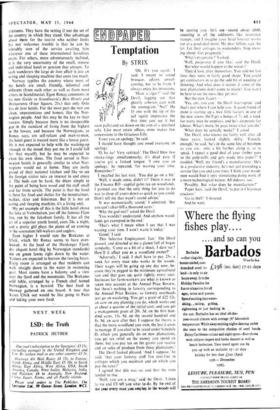PAPPLAPD
Temptation
By STRIX
'Oh. It's you again.' I said. I meant to sound brusque, a ffaire. unwel- coming, but to be frank always enjoy his intrusions.
'I owe you an apology,' he said.
'I should have thought you owed everyone an apology.'
'0, ha ha! Very satirical.' The Devil blew two smoke-rings simultaneously; it's dead easy if you've got a forked tongue. 'I owe you an apology,' he repeated, 'for wasting your time. Remember?'
I recalled his last visit. 'You did go on a bit.'
'Well, it made sense, didn't it? There it was in the Finance Bill—capital gains tax on woodlands. I pointed out that the only thing for you to do was to chop all yours down as quick as you could. Don't tell me that wasn't sound advice.'
'It was economically sound,' I admitted. '13w you can't clear-fell a thousand acres.'
'Why the god not?' asked the Devil.
You wouldn't understand. And anyhow wood- lands got exempted in the end.'
'That's what I mean when 1 say that I was wasting your time. I won't waste it today.'
'Good,' I said.
'This Selective Employment Tax.' The Devil paused, and directed at me a glance full of bogus sympathy. 'Came as a bit of a shock, I dare say? How'll it affect you as a woodland owner?'
'Adversely,' I said. I shall have to pay 25s. a week for every man who works in the woods. Their wages will be going up any day now, be- cause they're pegged to the minimum agricultural rate and that goes up, quite rightly, every year. Increases for farm-workers are what is known as taken into account at the Annual Price Review, but there's nothing in forestry corresponding to the Annual Price Review, so forestry overheads just go on escalating. You get a grant of £22 12s. an acre on any planting you do, which works out at about a quarter of the initial cost; and you get a management grant of 20i. 3d. on the first hun- dred acres, 13s. 9d. on the second hundred and Ss. 9d. an acre after that. I suppose the theory is that the more woodland you own, the less it costs to manage. If you elect to be taxed under Schedule D, which you generally do on new plantations, you get tax relief on the money you spend on them: but you pay tax on the grants you receive and on sales of produce from those plantations.'
The Devil looked pleased. 'And I suppose,' he said, 'that your forestry staff live rent-free in cottages which you maintain and on which you pay the rates?'
I agreed that this was so, and that the rates tended to rise.
'Well, you are a mug,' said the Devil. 'Listen to me and I'll tell you what to do. By the end of the year every man you employ in the woods will
be costing you—let's see—round about £800, counting in all the oddments like insurance stamps; and I imagine your head forester works out at a good deal more. My dear fellow, sack the lot. Let their cottages to weekenders. Stop me:s- ing about. Get pragmatic.'
'What's pragmatic?' I asked.
'Well, purposive if you like,' said the Devil. 'But what would happen to the woods?'
'They'd look after themselves. You told me last time they were in fairly good shape. You could get contractors in to do the odd bit of weeding or thinning. And what does it matter if some of the new plantations don't come to much? You won't be here to see the mess they get into.'
'But the men. I can't— • 'Yes, yes, you can,' the Devil interrupted. 'and that's just where I can help you. A good friend of mine is starting up a nice little factory in one of the new towns. He'll get a bonus of 7s. 6d. a week for every man he employs, and he's desperate for labour. What's more, he pays twice what you do.'
'What does he actually make?' I asked.
The Devil, who knows me fairly well after all these years, looked slightly shifty. 'Funnily enough,' he said, 'he's in the same line of business as you are: only a bit further along it, so to speak. I expect a good deal of your timber eoes to the pulp-mills and gets made into paper?' I nodded. 'Well, my friend's a manufacturer. He's in a productive industry, he's not just providing a service like you and your trees. 1 think your wood- men would find it very stimulating doing work of a more technological nature. All indoors, too.'
'Possibly. But what does he manufacture?'
'Paper hats,' said the Devil, 'to put in Christmas crackers.'
`Go to Hell!' I shouted.
And he went.


































 Previous page
Previous page